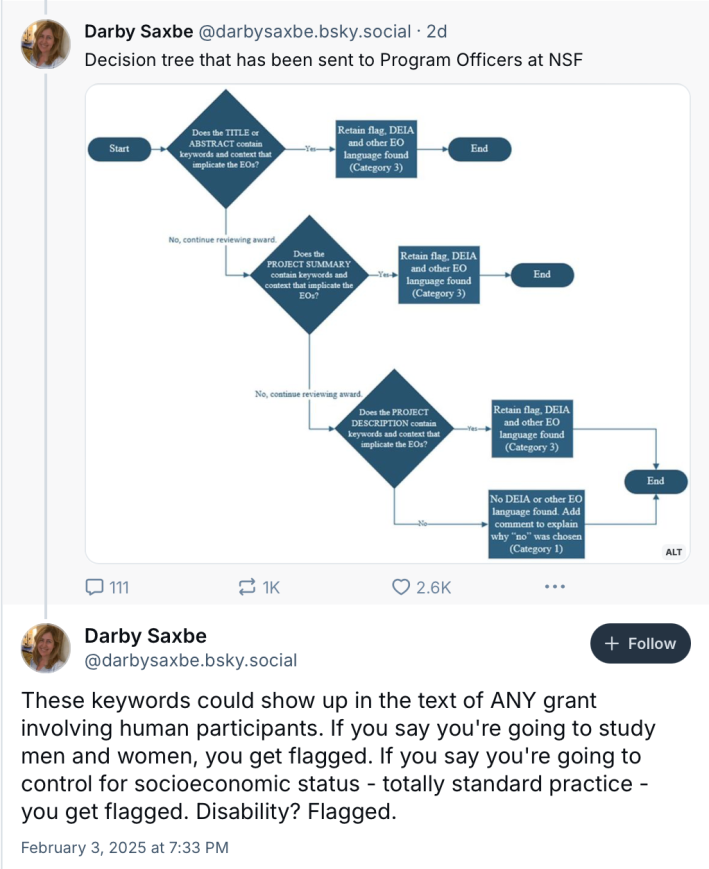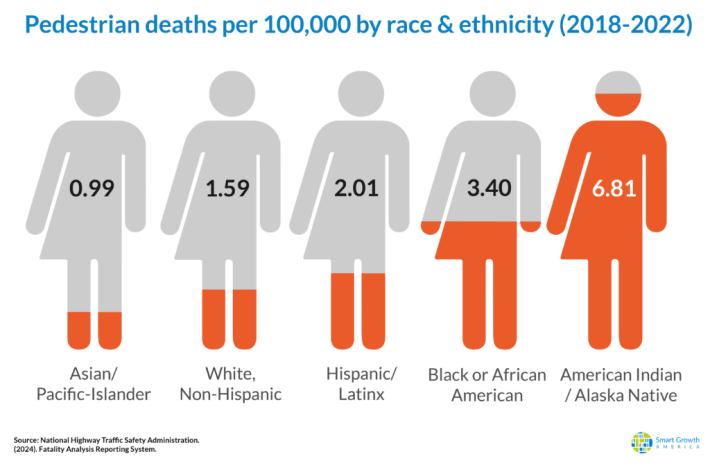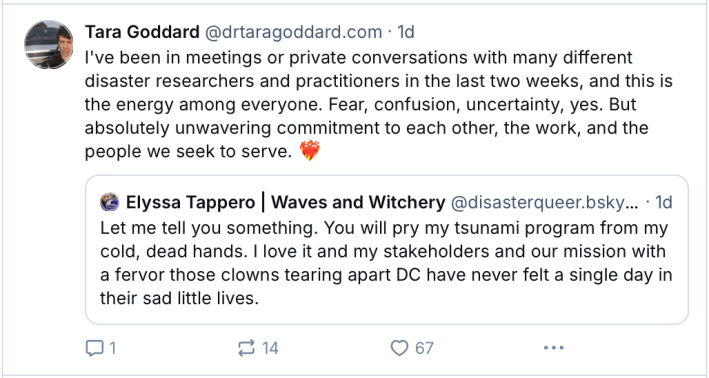Research on how police enforcement affects bicyclists, pedestrians, and other non-drivers of color. New strategies to increase diversity in the planning profession. A guide to help agencies to better serve the needs of trans, BIPOC, and other marginalized people who experience harassment when they ride the bus, as well as other barriers to getting around.
These are the kinds of research efforts that are being cancelled as part of the Trump administration's war on diversity, equity, inclusion and accessibility — and some fear the order will push the country even further backwards in its efforts to fix a broken transportation system that disproportionately kills, injuries and disenfranchises people from marginalized groups.
As part of a larger federal "anti-diversity witch hunt" sparked by President Trump's January executive order to end "wasteful and radical government DEI programs and preferencing," academics across the country have received notice that their federally funded grants have been cancelled, frozen, or flagged for review — including millions of dollars devoted to issues that are foundational to the movement for transportation reform.
Advocates are still attempting to measure the full scope of the purge, but Nature recently reported that at the National Science Foundation alone — a $10-billion grant-making agency that is among the leading funders of science and engineering research in the country — "around 10,000 research grants have been flagged for review" for possible violations of the executive orders, based in part on searches for broadly-used keywords that frequently arise in papers about the U.S. transportation system.
Those keywords included terms like "Black and Latinx," "disability," "gender," "historically, " "LGBT," "race and ethnicity," "systemic," and "women."

Of course, not all of those cancelled grants would have funded sustainable transportation research, and not every study about how America gets around has been caught in the dragnet. Nick Ferenchak, who directs the US DOT-funded Center for Pedestrian and Bicyclist Safety, said none of his programs has been impacted so far, and that the organization has been told "that there might be some revised language in the future, but we should continue [our existing projects] as normal for now."
"I honestly don't have any fears," added Ferenchak in an email to Streetsblog. "We are focused on improving pedestrian and bicyclist safety. According to NHTSA, there were 42,514 lives lost on US roadways in 2022 and that included 7,522 pedestrians and 1,105 bicyclists (20.3 percent of the total). As far as I can tell, safety is still US DOT's top priority, and I can't imagine them saying that that 20.3 percent isn't important."

Within that 20.3 percent of deaths, though, people of marginalized identities represent a disproportionate share of the bloodshed — potentially making it hard to prise apart efforts to save pedestrian and cyclist lives from the ill-defined concept of "advancing DEIA."
American Indians and Alaskan Natives, for instance, are more than four times more likely than their white counterparts to be killed while walking, while Black pedestrians are more than twice as likely; Black cyclists, meanwhile, are 4.5 times more likely to be killed than white people who ride on U.S. roads. (A grant to address that disproportionate death toll was one of the federal "Road to Zero" grants that has been frozen, as Streetsblog previously reported.)
People in wheelchairs have at least a 36 percent higher probability to be killed in traffic collisions than people without disabilities, though federally collected data on disability is already so poor that some experts suspect the ratio is far higher.
'How is that DEI?'
Needless to say, socioeconomic disparities are rampant in metrics of transportation equity besides death, too.
Thanks to more than a century of explicitly racist housing laws, highway sitings and countless other destructive policies — a dark history which some conservatives flatten down to liberals crying wolf over "racist roads" – communities of color suffer higher rates of deadly health conditions related to car pollution to this day, as well as less access to jobs and essential services, and deep disparities in transportation costs relative to household income.
Those who want to close those sorts of gaps, though, now find themselves in a political climate where even the act of studying them could prove politically dangerous.
Researcher Alex Karner, for instance, was leading a team that had been awarded $500,000 more than a year ago to study how transportation agencies might broaden their understanding of "accessibility" to include the lived experiences of a wide range of travelers, and had already conducted dozens of interviews and focus groups in support of that research. When he received word that his grant had been canceled, though, he struggled to understand how his project even remotely qualified as the kind of "shameful discrimination" the Trump memo promised to root out.
"It seems a lot is getting swept up in this anti-DEI hysteria based on a willful misunderstanding of the problems that DEI was intended to solve — which is the discrimination faced by Black, brown, and disabled people, among others," added Karner, who is an associate professor at University of Texas at Austin, but spoke to Streetsblog in his capacity as a private citizen. "Efforts to promote DEI are not discriminatory. They're attempting to provide a level playing field for folks that have actively been discriminated against."

In its announcement about his rescinded award, the National Academies of Sciences website also cited another Trump executive order about restoring access to "merit-based opportunity" — though Karner struggles to understand that rationale for the project's cancellation, either.
"Our work has little to do with workforce development and/or hiring," Karner added. "We were simply trying to understand why we continue to see dramatic disparities in things like traffic violence, transportation insecurity, and automobile ownership/transit use across the country. Clearly there's no one-size-fits-all solution. Trans people facing harassment on transit vehicles need different interventions than car-dependent rural residents struggling to afford the cost of driving. ... How is that DEI?"
Other academics fear that the full scope of the cancelled research could be even larger than it seems right now. Transportation Research and Education Center Director Jennifer Dill has so far identified at least six cancelled projects with "equity" in their title, but not all are yet listed as "cancelled" on public-facing websites. (Multiple researchers to which Streetsblog reached out chose not provide comment, and some implied that they feared that speaking out would have negative implications for their future livelihood and ability to conduct their work.)
"All of this seems counter to the values of the National Academies of Sciences, where these programs reside," Dill said in an email to Streetsblog, noting that those values include "independence," "objectivity," and "inclusivity" — the last of which is itself a component of the acronym "DEI."
'Wondering if we will be next'
For some researchers, even the specter of future cancelled grants is already having a chilling effect on their profession — and their own sense of financial security.
Tara Godard of Texas A&M, who also spoke in her capacity as a private citizen, is slated to collaborate on two grants that she fears will be cancelled soon, simply because their titles are replete with keywords that are "like a winning Bingo card for the 'anti-DEI' efforts."
"It is just a constant monitoring of emails and wondering if we will be next, especially since I have heard from multiple colleagues who have already heard about their projects being stopped, even ones already underway," Goddard added in an email to Streetsblog "Many of them do not know if they will even have jobs in the next week. It is pretty crushing, honestly."
Because she works on a nine-month contract like many university faculty members, Goddard says losing research grants would gut an income stream upon which she relies during the summers — and that her colleagues with fewer classroom duties rely even more heavily on federal grants to make ends meet. Mostly, though, she's worried the findings of already-completed projects will be buried or erased, and she's hesitant to submit future grants that could be rejected by reviewers fearful of angering a capricious administration whose orders are vague.
"I have yet to read or hear a single coherent reason why "DEI" or "DEIA" — because some people want to make sure that 'accessibility' is explicitly axed — is bad in transportation safety, particularly with respect to these funding programs," Goddard added. "That acronym is wielded like a bogeyman under the bed without any specifics [about] how any project that has race, gender, socioeconomics, disability, etc. involved is not a good use of funds, either from a safety or economic [perspective]. ... [And] the bigger effect of losing the ability to do this work – which informs policy and practice at every level of government — is hard to even address."

Even in the face of harsh headwinds, though, researchers like Goddard aren't giving up hope — and they're urging their peers and the advocates who support them to fight back.
Writing in Nature, Gretchen Goldman —who helped lead climate change and technology research at the US Department of Transportation during the Biden administration — noted that federally funded scientists actually "now have more rights and protection from political interference than ever," thanks to efforts from organizations like the Union of Concerned Scientists to establish unions and implement workplace protections. She advised her colleagues to "familiarize themselves with their agency’s scientific-integrity policy, communications policies, union rights and whistle-blower protections," and call out illegal behavior wherever they see it.
Goddard urged advocates to get in on the conversation, too.
"Calling and emailing (and showing up in person, if possible) to your reps helps," she added. "Mention the federal funding freezes and agency dismantling and NSF firings specifically. ... Tie [this] to issues that matter where you are. I reminded my senators and congressperson that Texas has not had a day without a roadway fatality since November 2001."
Most of all, though, sustainable transportation advocates need to understand the importance of strong research to pushing policy forward – and how challenging it will be for movements to win without it.
"The impact on the public in the transportation space will likely be a continuation of the disparate outcomes that we see and little change to the automobile-dependent status quo," added Karner. "We were beginning to engage with the reality that we need alternatives to driving that are safe, reliable, affordable, and convenient, and that we need to bring land-use/housing considerations into our transportation planning toolkit. It seems that all this progress could be lost."






